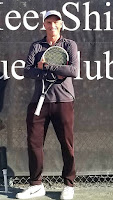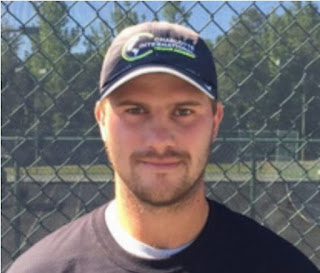OPRC Member Spotlight: Tim Wilkison
Tim Wilkison had a long and successful career on the tour which included 6 career singles titles and 10 doubles. He had wins against all-time greats such as Arthur Ashe, Boris Becker, Jim Courier, John McEnroe, Andre Agassi, and Pete Sampras to name a few. The Shelby, NC native competed in tournaments around the world including all four grand slams. He was once the number one ranked junior in the United States and would reach a career-high singles ranking of 23 in 1986 as a pro.
Wilkison earned the nickname “Dr. Dirt” due to his aggressive, never give up on a point mentality. He is often remembered for his diving volleys on the iconic grass courts of Wimbledon.
Since retiring from the tour, Wilkison has coached players of all skill levels for more than 25 years.
Wilkison earned the nickname “Dr. Dirt” due to his aggressive, never give up on a point mentality. He is often remembered for his diving volleys on the iconic grass courts of Wimbledon.
Since retiring from the tour, Wilkison has coached players of all skill levels for more than 25 years.
What was the most memorable match or event of your playing career?
I would say that the matches held at Grand Slam events are the most memorable. Regular tour events are fairly generic, but you get a real feel for the host country from the atmosphere at the Grand Slam events. The Australian Open is more relaxed and open than the other slams, just like the country. Then you go to the French Open and the player transportation is Citroens, croissants are served in the player cafeteria while linesmen and women are beautifully dressed in the latest fashion. Wimbledon follows with all the tradition of the ivy climbing the walls of the stadium, the royals in their center court box, and the military bands playing on the grass courts before the day's play begins. The year finishes in New York City and the US Open with fans yelling at you while the smell of cooking hamburgers floats over the court and planes fly overhead from LaGuardia Airport. If you can make it in New York, you can make it anywhere!
You played and defeated your share of all-time greats during your career. Who was the toughest opponent that you faced?
A general comment for everyone is that when you play a top player, you need to be aware of trying to play at a higher level than you can sustain because you think that is what is needed. You will actually make the match easier for your opponent because they will benefit from all the errors you make trying to play above your level. Play solid and make them prove that they are better than you. If you are in the same event, then the level must be close. Try to get one of the first three games in order to settle down and let them feel some pressure. Personally, it is hard for me to choose between Rod Laver, Ken Rosewall, Arthur Ashe, Stan Smith, Jimmy Connors, Bjorn Borg, Guillermo Vilas, John McEnroe, Pete Sampras, and Andre Agassi!
What was your favorite playing surface and why?
When I was younger my favorite surface was grass because it helped make my left-handed slice serve more effective. I wouldn't suggest training on that surface though as you don't have enough good bounces to develop your game. Most of the grass courts in the world, Wimbledon excepted, have terrible bounces. Try to play on clay courts as much as possible as it develops stamina (mental and physical) and shot selection.
You had success in singles and doubles during an era when there was more emphasis on doubles by top singles players. Do you ever see doubles consistently drawing top singles players again?
There has been some discussion of changing some of the rules that would require all players to participate in doubles, at least the ones who lose early in singles. I think that would be a good idea. Even if you are a "singles player", doubles can help improve crucial parts of your game; serve, return of serve, and net game. There is so little net game play in singles currently that doubles is a good way to get repetitions in that area of the court. During one of the best-sustained runs of my career, there were a couple tournaments where I lost early in singles but I was able to get to the semi-finals or finals of doubles so I stayed match sharp and was able to do well in the next week's singles event. But if the rules aren't changed then I don't think many of the top players will play doubles. It does make you appreciate what John McEnroe did, winning singles and doubles at many tournaments.
How would your game or playing style be different in today’s game compared to your era with the evolution of equipment and technology? And how do you feel today’s players would compete in the era in which you were in your prime?
I was able to have a front-row seat in the evolution of the professional game. When I first started, everyone used wooden racquets and almost everyone had a one-handed backhand. That meant you could come to the net against your opponent's backhand and they weren't really able to drive the ball past you. You might win or lose the point at the net but at least you had a chance to play the ball. Towards the end of my career, I would hit the same serve and follow up to the net against Michael Chang and his powerful two-handed backhand using a composite racquet. That was about the time I decided to become a coach! I haven't thought about your question before but if the current players had to use wooden racquets then I think they might lose. If they were able to use current racquets, then they would win.
You had success at all four slams. Is there one you look back at that stands out more than the others?
Well, I answered that one pretty well earlier, however....I have many friends in French tennis circles and it is obviously a magnificent event but it stands out to me as my "worst event" because I hardly ever won any matches! I did have one memorable win against a player named Miloslav Mecir. He was a better player than I was but what was memorable was the ending. I pumped my fist after his last shot floated over the baseline on my match point and immediately my arm completely locked up in cramps. I am glad I didn't pump my fist just getting to match point! That would have posed a problem.
In your opinion, why has there been such a lack of overall success at majors by the American men of late?
Well, if you aren't from Switzerland, Spain, or Serbia it has been pretty tough for every country for a while now! That said, I think our college system is part of it. The ability to play college tennis is fantastic in many ways but it is not conducive to developing Grand Slam winners. In order to do that, a player has to have complete dedication to that goal. It is a deeper dedication than most of us can understand. If college tennis is an option, then there is a small "safety net" that takes away a little bit of an edge. Basically, you need to turn professional out of high school, or earlier. That is what happens everywhere else in the world. A few American players are doing that, but most are waiting to see what happens with their development. That is an important difference.
What direction do you see the sport heading in the future?
At the highest level, I see the use of the slice, drop shot and net game being used more often. I am already seeing this at the very highest levels of junior tennis, and they will be the next professionals. At the junior level and adult club level I would like to see more people using the correct grips for the serve and net game. There is some variance in the grips that can be used effectively for the groundstrokes but there is only one grip for the serve, volleys, and overhead that is not going to hold you back (and possibly get you injured). All players can learn to use these grips so contact your Olde Providence tennis professionals!
What life lessons can be gained by playing the sport?
There are major companies in the world who specifically recruit young people who have played college or high school tennis. They do that because in those sports a player needs to both maximize their own personal development and also put the success of the team first if they are going to be successful. That is like most situations in life; a marriage, a job, volunteering for an organization, etc.
What is the best quality to have as a player?
Playing matches is the most important quality to have as a player. I am mentioning that because it is the major missing piece in most players' development plan, at least junior players. In trying to develop a professional player you would look to have them play 100 competitive matches per year. Those players aren't really going to school even if they are young so it will probably be hard for a local player to accomplish that number. You can play matches here though. It is important to play a full two out of three set match (match tie-breaker for the third set is fine). The start of the second set is crucial to see if the momentum switches or stays with the winner of the first set. The only way to improve that in your game is to experience playing that second set. Then closing out a match is always tough, and you only improve that by trying to do it over and over again. Playing one set and walking off the court doesn't give you experience in either of those areas. When I was younger, I used to play a three out of five set match every Saturday morning. You should try that. It is fun! Playing a lot of matches is the only way to use all the things your coaches tell you in your own, most effective way so I encourage everyone to play more matches.
If you were to change one thing about the sport, what would it be?
I am not sure that I would change much of what has happened up to now. Statistics show that there are fewer young people coming into the tennis coaching profession and I worry about that. The energy and new ideas they bring to the sport are crucial so I hope everyone will support all the professionals at Olde Providence but particularly the younger ones so they will realize the impact and importance they have.



Comments
Post a Comment